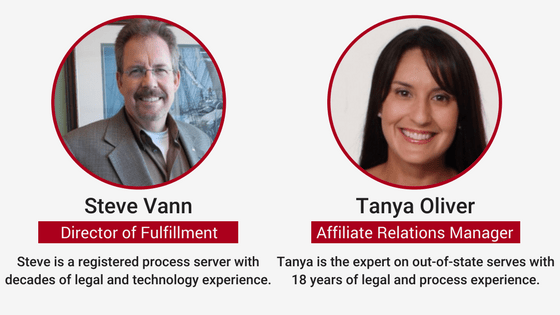One Legal is made up of a team of passionate, extremely knowledgeable individuals who each put their specific areas of expertise to good use for our customers. Meet the brilliant people behind the scenes to explore why and how we do what we do.

Steve and Tanya explain why they tap into their extensive network of professional process servers all around the country to complete hundreds of process serving orders each month.
When you need to deliver a serve to an individual or business regarding impending legal action, how do you get the right papers to the right people promptly while fulfilling all the rules of due diligence for your court?
One Legal has honed their approach to this question for many years and relies upon an extensive network of professionals to get important service of process orders to the right people and businesses.
Dedication and Reliability
A professional process server spends his or her day in the field, attempting serves and moving steadily forward on due diligence as quickly and efficiently as they can. And since they do not receive payment until the serve is complete, they are highly motivated to fulfill each attempt in good time.
Sheriffs are conducting serve attempts on the side of their full-time job, and will always have to give precedence to matters of more importance. He or she will get around to each attempt when and if they have time, which is good for the safety of their district, and not so great for the customer who needs a serve completed.
Additionally, a professional process server will go to extra lengths that a sheriff never will. Professional process servers will often get incredibly creative to complete their serves. Steve remembered one story about a difficult serve on a doctor. “A server put on a lab coat and a stethoscope. He never tried to impersonate a doctor or provide care—but because he looked the part he was able to walk around the hospital unchallenged until he found the doctor he needed to serve.”
Standards
States like California and New York have strict standards that professional process servers must meet for how serve attempts are conducted and how proof of service must be confirmed before it is returned.
At One Legal, we hold our process servers to the highest standards possible, regardless of their state’s regulations. “The national process servers outside of CA that we work with belong to associations and have been vetted,” Steve says, “And even if they don’t need to be registered in their state, we make sure that they meet our standards.” One Legal also puts all behind the scenes staff through the same rigorous California certification process, even if they aren’t going to be in the field, so that they have an in-depth understanding of the standards.
In areas where process serving is unregulated, we recommend at least using a company that has been thoroughly vetted and that we have worked with before. Officially, sheriffs are bound by all the same rules that professional process servers are, but no one is going to hold them accountable in the same way. So any serve will be more vulnerable when it reaches the court.
“In Oregon, for instance, there are no restrictions on who can be a process server or what standards you should meet to legally serve papers. There was recently a case that came up about a man who was going out and literally casing properties under the guise of a process server.”
Expertise
People who deliver serves for a living are very familiar with the codes, and know what they can and can’t do. “They know how many attempts they have to make to prove diligence, and when and where they can make them. And the requirements vary from county to county,” Tanya says. “In San Francisco County,” Steve adds. “The minimum number of attempts to prove due diligence is four; in Marin County, it is three.” Requirements for the serve are based on which court the case is being filed in, not where the person is physically being served. So process servers must be acutely aware of many different court regulations.
“Sheriffs don’t generally read instructions as closely,” Tanya said. “Even when we give them the rules for our court, they often disregard them.”
Not only do professional process servers know the rules, they also have accumulated a range of strategies for dealing with those harder serves. They know when to do a stakeout before making the first attempt, and when to go right up to the door. They mark the garage door, watch the PG&E meter, feel the hood of the car, and do whatever is needed to assess the pattern of the person for whom they are looking.
Mobility
One Legal provides process serving nationwide, which means that we have servers around the country ready to deliver papers. Working with a sheriff or a process server who is local to that area means that your due diligence becomes entirely dependent on the person you’re serving staying put. If he or she decides to leave town, the process gets delayed or must start all over again with someone willing to follow them. Our broad network means that we can assign your case to multiple servers as needed, following the individual if he or she tries to evade.
“When One Legal was tasked with serving papers to a famous musician, it wasn’t as easy as finding a home address, especially since this person was currently on tour. First, we conducted a Skip Trace to locate them. Then, after one failed attempt at the Las Vegas home of the musician’s friend, and several other failed attempts afterward, we looked up where the person was performing next. We connected with another one of our process servers in New Hampshire, where the smaller venue made it more likely that we could reach him–which we did. If we hadn’t been a national company with a broad network, we would have had to start all over again finding a process server in each state or waiting around for him to finally come home.”
Presentation
“A sheriff will mail back—always mail—a piece of paper that simply says, “Moved.”, Tanya explains. “No more information or leads. Whereas a professional process server will send: “talked to the neighbors who haven’t seen them in two years, there’s a ‘For Sale’ sign in the yard, here’s the number for the realtor…”” Because it is what they do, professionals are inclined to provide far more detail in their reports.
And whatever the process servers provide to One Legal, our team puts into a professional format with all the detail and evidence of due diligence that will be expected in court. Each date and time of attempt, the circumstances and events of the attempt, and any other notes are readily available for your review.
Following up
Should you need a process server to appear in court to identify the person who was served, or to answer questions about the service, a process server will show up and sit for hours to just describe what he or she did during the serve. “It’s just part of what we do as process servers,” Steve said. “But it may be challenging to convince a sheriff to show up to sit and wait in court.” Even for a perfect serve, this leaves the proof of your due diligence open to further scrutiny.
When to consider using a sheriff for service of process
There still may be instances when a law firm will want to consider using a sheriff to serve their paperwork, such as if:
- The person is in a federal prison, where only a US marshal can serve them
- Finances are tight, since a sheriff typically costs a bit less
- The person lives in a very rural area, where professionals are unavailable
- There is a threat of violence or violence has already been committed against a server
It’s important to remember that sheriffs are unlikely to respond to requests for status, stick to instructions, or call to check in. We usually don’t get updates, despite requests, until a letter comes in the mail indicating proof of service or non-service.
***
Over our 25 years in this industry, One Legal has developed a substantial network of well-vetted professionals with whom we have worked with before and who we know we can rely on. We’ve also experienced our fair share of frustrating sheriff encounters.
“Once, we were serving someone named ‘Jim Smith’,” Tanya told us. “And the sheriff did not serve him because the man had said his name was ‘Jimmy Smith’.” The sheriff had thought that it was not the same person.
On the other hand, we know we can always rely on the commitment and perseverance of our professionals.
“We had to serve an athlete once,” Tanya remembers, “And to get to him my server bought a football and stood in line for five hours to get it signed in order to get the serve. No sheriff would have done that.
“I never did get the football I paid for,” she realized. But our customer got the serve.
***
Do you have upcoming serves you’ll need processed? Ask our support team a question.
Want to share a crazy process serving story of your own? Tell us about it in the comments!








